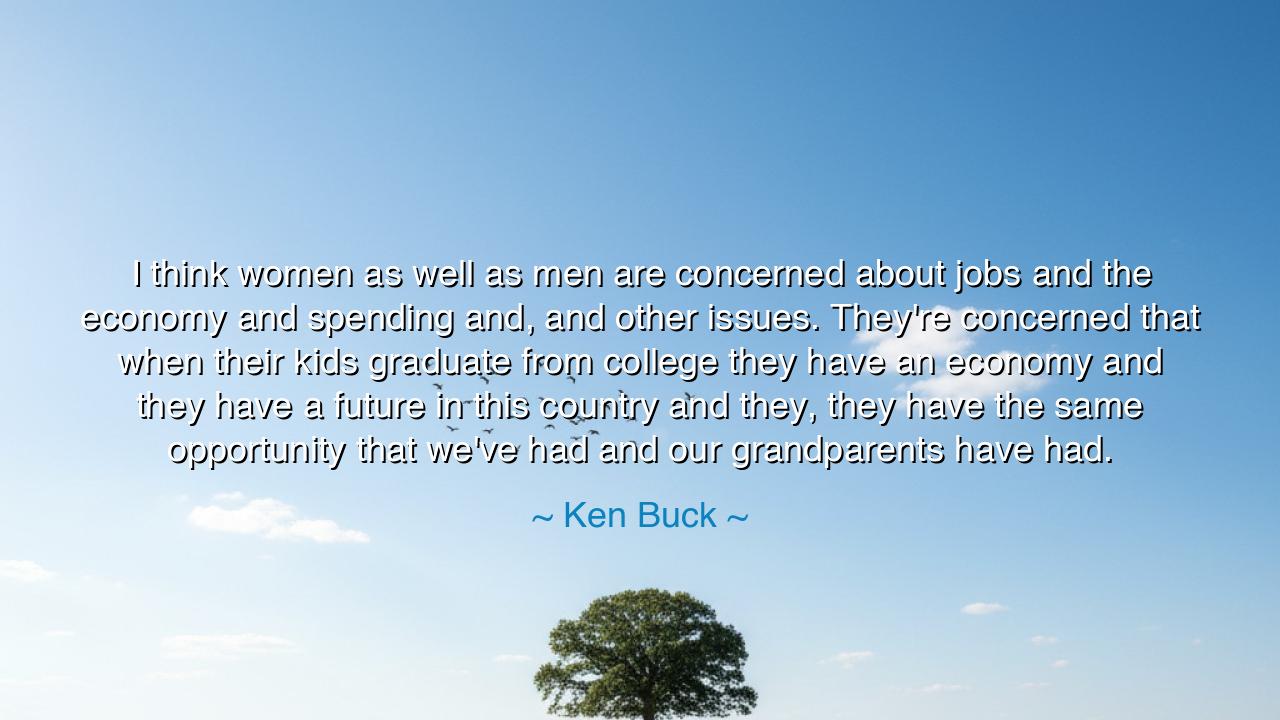
I think women as well as men are concerned about jobs and the
I think women as well as men are concerned about jobs and the economy and spending and, and other issues. They're concerned that when their kids graduate from college they have an economy and they have a future in this country and they, they have the same opportunity that we've had and our grandparents have had.






The words of Ken Buck — “I think women as well as men are concerned about jobs and the economy and spending and, and other issues. They're concerned that when their kids graduate from college they have an economy and they have a future in this country and they, they have the same opportunity that we've had and our grandparents have had.” — resound with the voice of continuity, of generations bound by the same eternal hope: that their children will live with dignity, freedom, and opportunity. Though spoken in the language of modern politics, this sentiment belongs to the ancient chorus of human history — the cry of every parent, every builder of nations, every guardian of the future. Beneath his words lies the timeless truth that prosperity and fairness are not gifts to be enjoyed, but trusts to be preserved.
When Ken Buck speaks of both women and men, he calls forth a vision of shared responsibility — that the duty to safeguard the nation’s future belongs to all, regardless of gender. In this, he echoes the wisdom of the ancients, who taught that the strength of a society lies not in division, but in unity of purpose. Whether in the home, the field, or the council hall, all who labor for the next generation are bound by a single, sacred task: to ensure that those who come after us inherit more than they were given. His words remind us that the economy is not merely a system of wealth, but the living heartbeat of a civilization — the measure of its justice, its stewardship, and its faith in tomorrow.
The heart of his message lies in the concern for the young, for those who stand at the gates of adulthood with dreams in their hands. The graduation he speaks of is more than a ceremony; it is a threshold, a passage from dependence to destiny. Yet too often, the young find themselves stepping into uncertainty — a world where the promise of opportunity seems dimmed by debt, by imbalance, by the erosion of stability. Buck’s words are a call to vigilance: that those who build the world today must remember those who will inherit it tomorrow. For what use is progress if it leaves the next generation burdened and disillusioned?
In every age, the wise have recognized this sacred duty. The Roman statesman Cicero wrote that a republic endures only when its leaders care more for the future than for the fleeting comfort of the present. Likewise, the American founders — themselves inheritors of ancient wisdom — built their nation with an eye toward posterity. They planted the tree knowing they might never rest beneath its shade, but trusting that their children would. And so it is now: Ken Buck’s words call us back to that ancient virtue of stewardship, to think not only of profit and power, but of permanence and purpose.
The anxiety he names — the fear that our children may not enjoy “the same opportunity that we’ve had” — is the unease that awakens nations. It is the same fear that stirs revolutions, that drives reform, that rekindles the moral conscience of societies grown careless. For opportunity is not a birthright; it is a torch that must be carried carefully, lest it be extinguished by neglect. If the economy falters in justice, if jobs fail to provide dignity, if education ceases to uplift, then the promise of equal opportunity fades — and with it, the spirit of democracy itself.
But there is also hope in his vision — the hope that by acknowledging this shared concern, we may reclaim our strength. For as long as women and men labor together, with courage and compassion, the future can be mended. The economy, like a field, flourishes when all take part in its cultivation. The parent who teaches, the worker who strives, the citizen who votes with conscience — all are farmers of the same soil, sowing the seeds of tomorrow’s prosperity.
So let this be the lesson, O listener: do not consume the fruits of the present without planting anew for the future. Remember that every generation stands upon the shoulders of those who came before — and in turn, must offer its own shoulders to those who come next. Support education, honor honest work, uphold fairness in trade and governance, and above all, cherish the unity of purpose that binds all citizens as one.
For as Ken Buck reminds us, the measure of a society’s greatness lies not in its wealth, but in the opportunities it preserves for its children. Let us therefore live and labor in such a way that when the next generation steps forth from its graduation halls — eyes bright with hope — they may find a world ready to receive them, rich not only in prosperity, but in promise. Thus shall the chain of generations remain unbroken, and the dream of progress live on.






AAdministratorAdministrator
Welcome, honored guests. Please leave a comment, we will respond soon